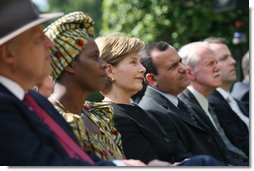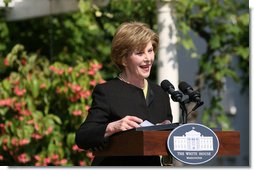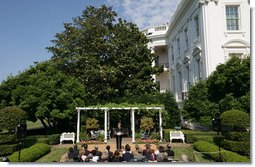|
Home >
News & Policies >
June 2008
|
For Immediate Release
Office of the First Lady
June 20, 2008
Mrs. Bush's Remarks in Honor of World Refugee Day
East Garden
9:36 A.M. EDT
MRS. BUSH: Thanks, everybody. Thank you all. Welcome here to the First Lady's Garden. This is a beautiful day and a beautiful place, I think, for us to observe World Refugee Day together. So many distinguished guests here who have worked for years to help resettle refugees, and thank you all for your work.
I want to acknowledge the Honorable Craig Johnstone, who is the U.N. Deputy High Commissioner. Thank you very much, Craig, for joining us today. Michael -- rather, Michel Gabaudan, the U.N. High Commissioner for Refugees Washington Regional Representative -- thank you, Michel. And then Secretary John Negroponte, from the U.S. Department of State, and Diana, thank you very much for joining us. And Deputy Secretary Tevi Troy, from the U.S. Department of Health and Human Services, and Mr. Chad Sweet, Chief of Staff for the U.S. Department of Homeland Security.
 Distinguished guests -- and I know in our crowd are people who've worked for years for refugees to do whatever you can to help them resettle or be able to go home and live in safety.
Distinguished guests -- and I know in our crowd are people who've worked for years for refugees to do whatever you can to help them resettle or be able to go home and live in safety.
Today, as we commemorate World Refugee Day, a U.N. survey reports that more than 11 million people are living as refugees worldwide, and millions more have been displaced by conflict or persecution. On World Refugee Day, the international community recognizes the challenges faced by these men, women, and children.
We recognize citizens from African nations like Somalia and Sudan, who were forced to flee their homes by ongoing violence. We recognize families from Iraq and Afghanistan, who were terrorized in their neighborhoods. And, on only one day after Aung San Suu Kyi's birthday, where she's passed another year under house arrest, we recognize activists and ethnic populations in Burma, who were pushed into refugee camps by an oppressive military regime.
The United States contributes more assistance to refugee populations than any other government. This year, we'll spend nearly $1.2 billion to facilitate refugee resettlement and to provide food, shelter, and supplies to those who fled their homes in search of safety.
I'm pleased to announce that this morning, President Bush approved a $32.8 million emergency funding to support unexpected and urgent needs, including food, for refugees and conflict victims in Africa, the Middle East, Asia, and the Western Hemisphere.
Many American families came to this country to escape repressive regimes and build better futures. We honor this legacy by welcoming more refugees annually than any other nation.
In the past 30 years, the United States has accepted some 2.7 million refugees. And this year, we'll take in as many as 70,000 displaced men, women, and children.
 World Refugee Day is a chance to commemorate these humanitarian commitments. And it's an opportunity to thank the men and women who've worked to make these commitments possible. And many of you are here today.
World Refugee Day is a chance to commemorate these humanitarian commitments. And it's an opportunity to thank the men and women who've worked to make these commitments possible. And many of you are here today.
The United States thanks our international partners -- especially the Office of the U.N. High Commissioner for Refugees -- for your work to aid refugees, stateless persons, and internally displaced people around the world.
Thanks also to the staff of the United States State Department, who distribute the U.S. financial assistance and facilitate travel to America for thousands of refugees; to staff from the United States Department of Homeland Security, who travel the world to speak with refugees and to help settle their claims; and to staff from the United States Department of Health and Human Service, who help refugees build safe lives in their new American hometowns.
We all know that much work remains to meet the needs of refugees, and to deal with the violence and the persecution that causes the displacement in the first place. We're improving our refugee programs, and we're looking for the most effective ways to help those who seek resettlement in the United States. And we're standing in support of human dignity and the rule of law in countries from Burma to Zimbabwe.
Today, three successfully resettled refugees will encourage us to renew our commitment to this cause.
Eh Moo Hoffman was born in a refugee camp on the Thai-Burma border. Her parents had fled from Burmese soldiers who tortured, raped, and killed her native Karen people. After more than 20 years living in danger, she and her family were able to resettle in the United States last year.
Zeyad Abdel Okhowa fled Iraq with his family after his work with the U.S. Embassy in Al Hillah put him in danger. Today, he works with the State Department's Digital Outreach Team to help improve understanding between Arab and Muslim communities and the United States.
Rose Mapendo's husband was executed, and she and her children were imprisoned in the Democratic Republic of Congo. She gave birth to twins while she was in jail, and she struggled to keep them alive. Rose and her children fled the Congo on an emergency evacuation flight in 2000. Today, she's an American citizen and the spokesperson for "Mapendo International," a non-governmental organization that assists refugees.
 Thanks to each of you for sharing your stories and for shining a light on the needs of refugees around the world.
Thanks to each of you for sharing your stories and for shining a light on the needs of refugees around the world.
I'm now pleased to introduce our first speaker: Eh Moo Hoffman. (Applause.)
* * * * *
MRS. BUSH: Those were three powerful stories. So thank you so much for telling us your stories. And it does encourage us to redouble our efforts and do whatever we can for refugees around the world.
Thank you all. Thanks to everyone here who works on these challenges that face refugees every single day. Thank you for what you do and thank you all for telling us your stories. And may God bless you all, and so good to see you all today.
Thanks a lot. (Applause.)
END 10:13 A.M. EDT


